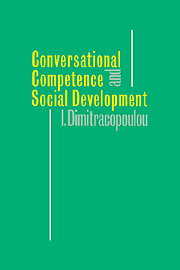Book contents
- Frontmatter
- Contents
- List of figures
- List of tables
- Acknowledgments
- 1 Introducing pragmatics
- 2 Toward an elaborated model of language: speech-act theory and conversational analysis
- 3 Language use and social functioning
- 4 Methods of research
- 5 Evidence on language use
- 6 Interdependence of social cognition and communication
- 7 Implications and applications
- Appendix 1
- Appendix 2
- Notes
- References
- Author index
- Subject index
4 - Methods of research
Published online by Cambridge University Press: 25 March 2010
- Frontmatter
- Contents
- List of figures
- List of tables
- Acknowledgments
- 1 Introducing pragmatics
- 2 Toward an elaborated model of language: speech-act theory and conversational analysis
- 3 Language use and social functioning
- 4 Methods of research
- 5 Evidence on language use
- 6 Interdependence of social cognition and communication
- 7 Implications and applications
- Appendix 1
- Appendix 2
- Notes
- References
- Author index
- Subject index
Summary
The research I report here has four specific goals:
(1) To investigate the kind of social functions language performs at different points in the child's development. This requires an exploration of the young child's ability to use language to make reference to objects, to make requests, to assert and to initiate conversations. It also involves an examination of the degree to which children at different developmental points are competent in producing successful speech-acts and coherent discourse.
(2) To analyze the kind of interaction in which children are able to engage. The focus here is on how the child's social interaction changes with his or her development. This is analyzed with reference to the development of the child's language use investigated in (1).
(3) To examine when and how children begin to understand the “conversational meaning” of an utterance. The aim here is to understand the interpretative process which occurs in conversational exchanges. This entails an analysis of the development of linguistic communication with respect to those inferential abilities which help young children to see conversational acts as accomplishments of social episodes.
(4) To examine the relationship between the development of children's socio-cognitive abilities and the development of their capacity to be competent conversational partners. This leads to an analysis of children's performance on certain socio-cognitive tasks as it relates to their language use and conversation as studied in (1), (2) and (3).
- Type
- Chapter
- Information
- Conversational Competence and Social Development , pp. 51 - 75Publisher: Cambridge University PressPrint publication year: 1990



